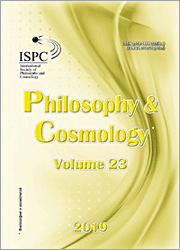The Conceptualization of Σοφία in Ancient Greek Philosophy: from Earthly to Cosmological
The Conceptualization of Σοφία in Ancient Greek Philosophy: from Earthly to Cosmological
Author(s): Yevhen KharkovshchenkoSubject(s): Epistemology, Ancient Philosphy
Published by: Международное философско-космологическое общество
Keywords: σοφία; ancient philosophy; Plotinus; cosmology; wisdom;
Summary/Abstract: The article reveals the evolution of the concept of σοφία in the ancient philosophical tradition. It is established that in ancient texts, for the most part, attention is focused on the general understanding of this concept, namely on the interpretation of σοφία as wisdom, practicality, and abilities. It is proved that in the Neoplatonic tradition, primarily in Plotinus’ works, σοφία acquires a cosmological character, and therefore in the ancient Greek culture, we can see the transformation of the understanding of this term in the displacement of its interpretation from purely earthly to heavenly. Philosophy of Plotinus, according to Alexei Losev, has a speculative-theoretical nature, which allows us to study the specifics of the abstract understanding of cosmology in ancient culture. Plotinus focuses his attention on such concepts as the One, the Mind, and the Soul. The specifics of the existence of the concept of σοφία is revealed through an appeal to the One in the philosophy of Plotinus. The One acts as an intermediary, which ensures the emanation of σοφία from God to the world. In the concept of Plotinus, the theory of the ascent of the soul from sensual fragmentation to spiritual concentration, when the mind concentrates in the One, is also important. Plotinus, accordingly, refers in this context to the concept of νους, which is an ideal world of forms. It is found that the external nature of this concept in Neoplatonism is revealed in the fact that σοφία refers not so much to earthly wisdom as to the understanding of man’s place in the universe. The Logos, which is realized on the basis of the Mind, Plotinus calls εἶδος, in relation to which the philosopher uses the term σοφία (wisdom, sophia). It is the main principle of the Plotinus’ aesthetics. Thus, in the center of Plotinus’ thinking is the problem of the unhappy situation of human in the world, the person who suffers. Accordingly, cosmology (and cosmogony) go alongside with the concept of Plotinus about the human. Plotinus tries to comprehend the reasons that led to such consequences. Sophia devoted a separate doctrine — sophiology. It is presented especially vividly in Russian philosophical thought. In particular, this article examines the concept of sophiology in the philosophy of Sergei Bulgakov, where the Sophia is the basis of the world’s ontological unity of the (sophological monism). Pagan, ancient interpretations of the concept of σοφία, thus, turn into the biblical image of Sophia, which receives a broad philosophical (abstract) interpretation.
Journal: Philosophy and Cosmology
- Issue Year: 23/2019
- Issue No: 23
- Page Range: 139-146
- Page Count: 8
- Language: English

